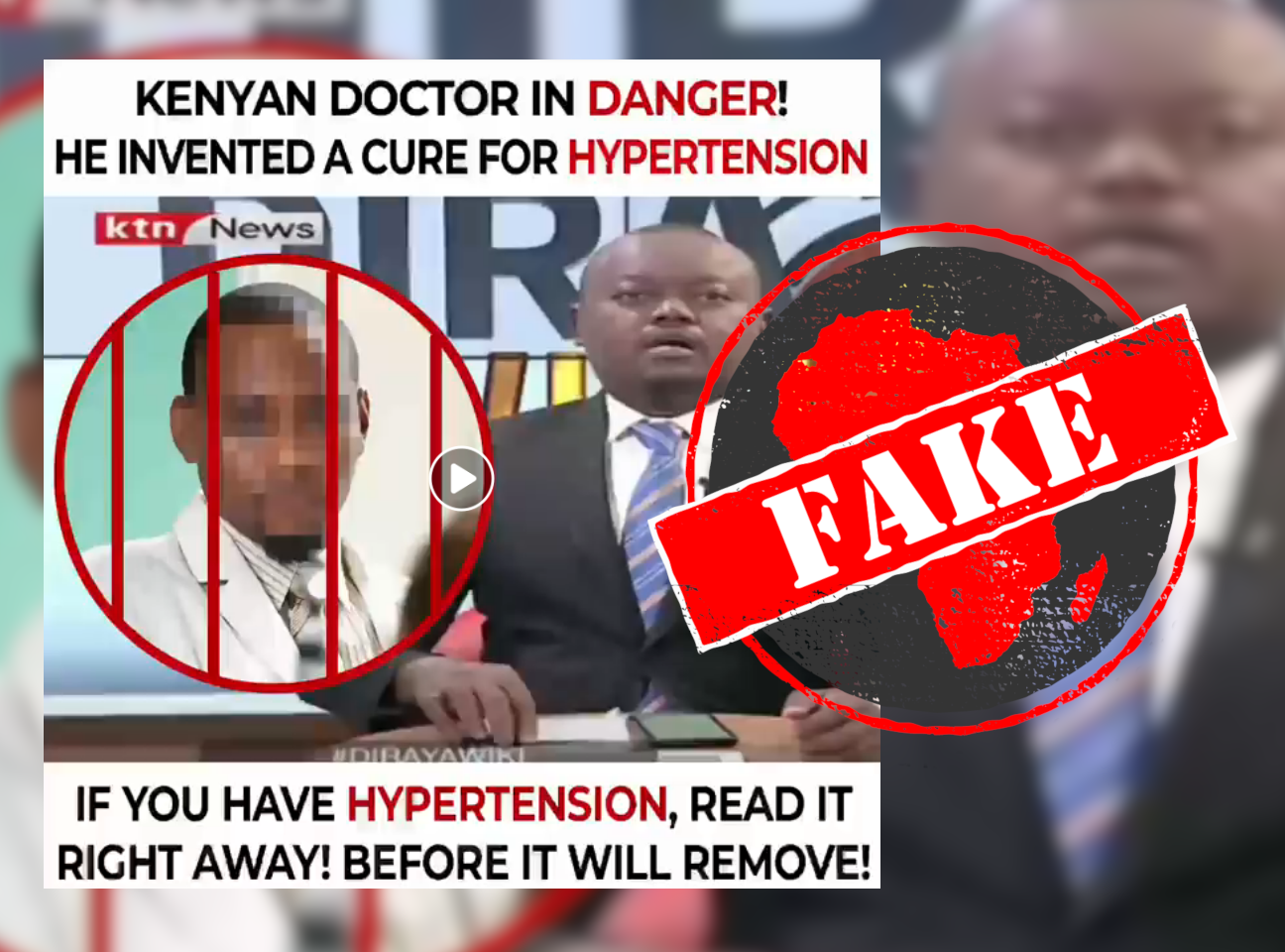IN SHORT: A video claims that a Kenyan doctor has invented a cure for high blood pressure and is so, for an unexplained reason, in danger. The video includes the logo of KTN News and a clip of anchor Ali Manzu. But the channel – and Manzu – never reported this “news”.
A 10-second video posted on Facebook shows what appears to be a report by Kenya’s KTN News TV channel, presented by well-known anchor Ali Manzu.
All-caps text above and below the video reads: “KENYAN DOCTOR IN DANGER! HE INVENTED A CURE FOR HYPERTENSION. IF YOU HAVE HYPERTENSION, READ IT RIGHT AWAY! BEFORE IT WILL REMOVE!”
The video is nothing more than a loop of the same words said again and again over a short clip of Manzu, as if it is him speaking. It includes the KTN News logo and a pixelated photo of a man in a white lab coat, with red bars over his face.
The video has been viewed more than 166,000 times.

No cure for hypertension
Hypertension, known as high or raised blood pressure, is a health condition in which the blood applies too much pressure against the walls of the blood vessels. The heart then has to work harder to pump blood throughout the body.
It is a serious condition that can increase the risk of other diseases. The World Health Organization says about 1.3 billion people across the globe have hypertension – with most of the cases in developing countries.
In 2015, nearly a quarter (23.7% or 5.7 million) of Kenya’s adult population had hypertension, according to the WHO’s most recent estimate.
High blood pressure can’t yet be cured. It can be controlled with medicine and self-care.
But did KTN air news of a Kenyan doctor discovering what would be a groundbreaking cure for hypertension – and so is for some reason in danger? We checked.
The usual red flags
The video has features common to fakes. First is its poor grammar. Second is its use of scare tactics and urgency. The video claims that the doctor is in danger for “discovering a cure” and urges viewers to “read it right away” before it is removed.
These, and the fact that the short video doesn’t provide any context, are red flags that should make us cautious – before we believe and share the claim.
And a closer look reveals that the news anchor’s lip movement is out of sync with the voice over the video.
Manzu is a well-known senior KTN Kiswahili news anchor with an easily recognised voice. It’s clear the voice in the video isn’t his. And the voice mechanically repeats the text on the video, with an odd pitch (and mispronouncing “read”). This suggests the audio was created with automated text-to-speech technology.
Africa Check asked Manzu if the video was legit.
“This is fake news,” he told us.
“It’s the second time that someone has overlaid another voice on a video of me, suggesting that I’m reading – yet, it’s not lip synced.”
He added: “Besides, I don’t present English news. I’m a Swahili news anchor, and I don’t confuse my viewers. It’s clearly fake news.”
The video is fake.
Republish our content for free
For publishers: what to do if your post is rated false
A fact-checker has rated your Facebook or Instagram post as “false”, “altered”, “partly false” or “missing context”. This could have serious consequences. What do you do?
Click on our guide for the steps you should follow.
Publishers guideAfrica Check teams up with Facebook
Africa Check is a partner in Meta's third-party fact-checking programme to help stop the spread of false information on social media.
The content we rate as “false” will be downgraded on Facebook and Instagram. This means fewer people will see it.
You can also help identify false information on Facebook. This guide explains how.


Add new comment